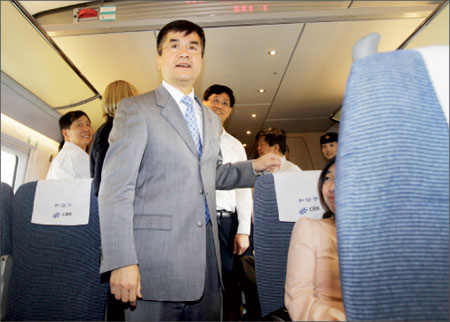Chinese funds could help strengthen US infrastructure
Updated: 2012-02-14 15:28
By Zhang Yuwei (China Daily)
|
||||||||
|
Gary Locke , US ambassador to China, stands on board a China Railway high-speed train while riding to Tianjin from Beijing, to visit American companies in May 2010 when he was US minister of commerce. Many Chinese companies have been keen to tap into the infrastructures in the United States. [Jason Lee / Reuters] |
NEW YORK With Chinese investment into the United States increasing, Chinese companies' assistance in rebuilding the crumbling infrastructure system in the US comes at an opportune time.
In the 2013 budget US President Barack Obama sent to Congress on Monday, he proposed more than $350 billion in short-term measures for job growth, including an investment of $50 billion from the surface transportation reauthorization bill for roads, rails, and runways to create new jobs.
Obama has, on many occasions, stressed the need to rebuild America's crumbling infrastructure.
"Building a world-class transportation system is part of what made us an economic superpower," said Obama in a speech last year on job creation. He added that the US cannot "sit back and watch China build newer airports and faster railroads."
China, on the other hand, has embarked on a fast lane of building its infrastructure in the past few years. Many say this is something China can definitely teach the US.
Francis Fukuyama, a fellow at the Freeman Spogli Institute for International Studies at Stanford University, in his Financial Times piece, argued "the most important strength of the Chinese political system is its ability to make large, complex decisions quickly, and to make them relatively well, at least in economic policy."
This, he wrote, is most evident in the area of infrastructure.
"Americans pride themselves on constitutional checks and balances, based on a political culture that distrusts centralized government," he wrote.
China's helping role in helping almost sounds perfect because it can provide expertise and, most importantly, capital what the US needs most in various infrastructure projects.
In Beijing, four new subway lines will start operating later this year, making the city's total length of the subway lines exceed 450 kilometers. That number will allow Beijing to reach the international standard of having a "real subway network".
Across China, other examples include the high-speed rail, newly built airports, train stations and other infrastructure projects coming soon.
In the New York tri-state metropolitan area, just two years ago New Jersey canceled a project that would have built a new tunnel between New Jersey and Manhattan in order to close short-term budget gaps. Commuters currently take trains that share a tunnel under the Hudson River with Amtrak, the national rail carrier, running on two tracks built in 1910.
Last year, Obama proposed $80 billion for infrastructure, $30 billion of which is for repairing and renovating schools and $50 billion for other infrastructure projects.
However, that number pales in comparison to what China has committed to its infrastructure.
China's Ministry of Railways said that it will spend about $300 billion in building transportation systems through 2020, while the US Federal Railroad Administration said it would commit about $8 billion in similar projects.
Yuan Ning, president for China Construction America (CCA), a wholly owned subsidiary of China State Construction Engineering Corporation (CSCEC), said the perfect way for China and the US to collaborate is through the Public-Private Partnership, or the PPP, for infrastructure projects.
The PPP is a government service or private business venture, which is funded and operated through a partnership of the government and one or more private sector firms.
Yuan said Chinese companies working through the PPP with the US government and private sectors is a "win-win solution".
Robert Hormats, US under secretary for economic growth, energy, and the environment, agrees that the PPP is a good way to work with the Chinese companies in infrastructure projects.
"Chinese investment can be really helpful. We would love to have more of that and we will be pursuing that dialogue with the Chinese," Hormats said after a business event in New York on Feb 1.
Chinese companies not only see the opportunity but also have shown a commitment to be a part of this growth.
CCA's parent company CSCEC recently said it will invest $2 billion in the next few years in the US market for PPP infrastructure projects, mergers and acquisitions and residential projects.
Joe Catapano, a project manager with CCA, said the expertise and capital Chinese companies can provide is important.
"The key issue is money. It doesn't seem the United States government is willing to spend money (on building infrastructure). There isn't a lot of financial support for a lot of infrastructure work that needs to be done," said Catapano, who has 12 years of engineering experience in New York and California.
"High-speed rail is definitely something we can learn from China. We don't have any of that in the US, anywhere," he added.

 Relief reaches isolated village
Relief reaches isolated village
 Rainfall poses new threats to quake-hit region
Rainfall poses new threats to quake-hit region
 Funerals begin for Boston bombing victims
Funerals begin for Boston bombing victims
 Quake takeaway from China's Air Force
Quake takeaway from China's Air Force
 Obama celebrates young inventors at science fair
Obama celebrates young inventors at science fair
 Earth Day marked around the world
Earth Day marked around the world
 Volunteer team helping students find sense of normalcy
Volunteer team helping students find sense of normalcy
 Ethnic groups quick to join rescue efforts
Ethnic groups quick to join rescue efforts
Most Viewed
Editor's Picks

|

|

|

|

|

|
Today's Top News
Health new priority for quake zone
Xi meets US top military officer
Japan's boats driven out of Diaoyu
China mulls online shopping legislation
Bird flu death toll rises to 22
Putin appoints new ambassador to China
Japanese ships blocked from Diaoyu Islands
Inspired by Guan, more Chinese pick up golf
US Weekly

|

|







